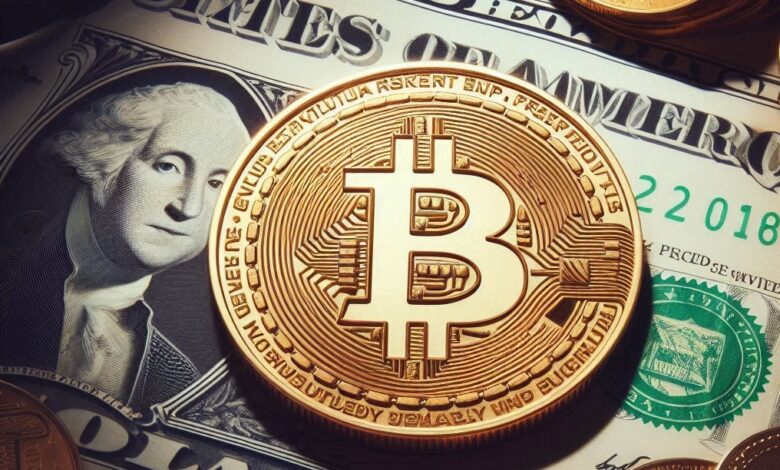Bitcoin: The Unexpected Ally of the Federal Reserve

Despite its anti-establishment nature, Bitcoin may actually be proving to be a beneficial force for the Federal Reserve. While traditionally seen as a rival to traditional financial systems, the cryptocurrency is serving a surprising role in drawing attention away from gold, which could otherwise spotlight the errors in central banking policies.
Bitcoin Steals the Spotlight from Gold
Critics argue that Bitcoin, the world’s leading cryptocurrency by market value, is overshadowing gold, diverting attention from the precious metal. Economist and gold advocate, Peter Schiff, suggests that Bitcoin’s popularity is pulling the spotlight away from gold at a critical time. With gold recently reaching an all-time high of $2,630 per ounce, this surge could have revealed the weaknesses in current Federal Reserve policies, particularly around interest rate decisions.
The recent spike in gold prices followed the Federal Reserve’s decision to lower interest rates by a larger-than-expected 50 basis points. This move boosted gold’s appeal as a safe haven asset during times of economic uncertainty. Historically, when the Federal Reserve cuts rates, investors flock to gold as a hedge against inflation and currency devaluation. However, Bitcoin has been capturing a share of that investment attention, thereby muting some of the gold rally’s impact.
Bitcoin’s Rally: A New Economic Player
Bitcoin, despite its reputation as a volatile and unpredictable asset, also gained some ground following the Federal Reserve’s interest rate cut. Recently, Bitcoin reclaimed the $64,000 mark, though it still remains significantly below its all-time high from earlier in March. This resurgence has reignited debates over whether Bitcoin can serve as a store of value akin to gold or whether it is still too volatile to play such a role in global finance.
Cryptocurrency advocates argue that Bitcoin offers an alternative to traditional assets like gold, particularly for younger investors who may be more skeptical of the value of precious metals. For these investors, Bitcoin represents a decentralized and potentially more secure form of wealth preservation, especially in an era of unprecedented central bank interventions and fiat currency risks.
The Growing Competition: Bitcoin vs. Gold
This growing rivalry between Bitcoin and gold raises questions about the future of traditional assets in an increasingly digital economy. While gold has long been the go-to asset in times of crisis, Bitcoin is now being seen as a viable competitor, especially among tech-savvy investors. The debate has even reached high-profile investors and market analysts, with some predicting that Bitcoin may one day surpass gold in terms of market dominance.
Prominent commodity trader Peter Brandt recently shared his view that Bitcoin could soon outperform gold significantly. Brandt based his forecast on a technical analysis pattern known as the “inverse head and shoulders” (iH&S), which he believes signals a major upcoming rally for Bitcoin. Should this prediction come true, Bitcoin could challenge gold’s long-standing position as the ultimate safe haven asset.
The Federal Reserve’s Quiet Advantage
Interestingly, Bitcoin’s rise could be playing right into the hands of the Federal Reserve. By attracting attention away from gold, Bitcoin helps prevent gold prices from soaring too high, which would typically be seen as a sign of distrust in central banking policies. A dramatic rise in gold prices could lead to a crisis of confidence in the Federal Reserve’s handling of the economy. Therefore, Bitcoin, despite being viewed as a threat by some financial institutions, may actually be providing an unexpected advantage to the Federal Reserve by keeping some of that pressure off gold.
Read more Bitcoin vs. Gold: A 400% Surge Predicted by 2025 – Expert Insights”
The Federal Reserve’s rate cuts, aimed at stimulating the economy, often lead to inflation concerns, which traditionally push investors towards gold. However, with Bitcoin drawing more attention and investment, the Federal Reserve benefits from a less extreme gold rally, giving the central bank more breathing room as it navigates economic challenges.
Conclusion: Bitcoin’s Dual Role in the Financial Ecosystem
While Bitcoin is often portrayed as the nemesis of traditional financial systems, its rise may be offering a surprising benefit to institutions like the Federal Reserve. By diverting attention away from gold, Bitcoin helps to prevent the precious metal from signaling the extent of economic instability. As both Bitcoin and gold continue to rise and fall in response to Federal Reserve policies, the relationship between these assets and their role in the global economy will be an area to watch closely.
In the future, Bitcoin’s place in the financial ecosystem could evolve further, potentially challenging gold’s long-held dominance as the preferred store of value. For now, however, it seems that Bitcoin’s unexpected alliance with the Federal Reserve is keeping both assets in check—each rising, but not without the other balancing the scales.
Important Notice: The content presented in this article is intended for informational purposes only and should not be interpreted as financial advice. Coinshibainu.com bears no responsibility for any investment decisions made relying on the information contained herein. It is highly recommended to consult with a qualified expert or financial advisor before making any investment decisions.



